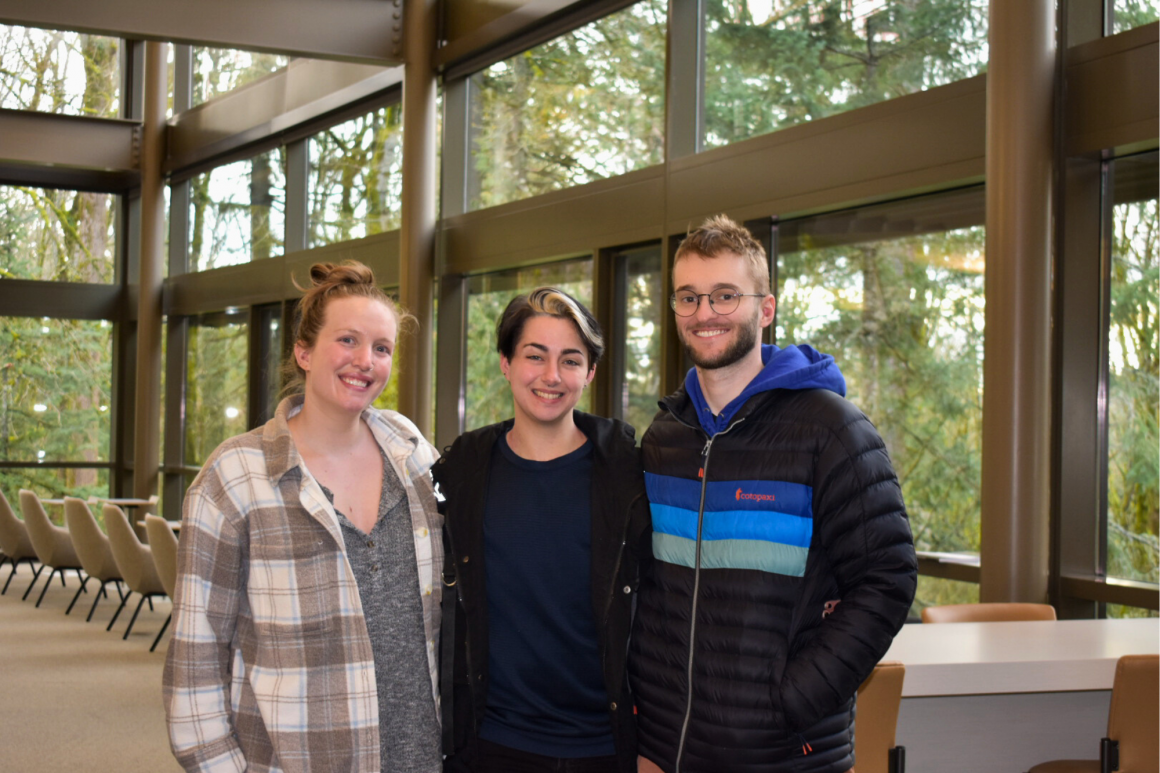main content Street Law: The Law School Class That Breaks the Mold
Experience law beyond the classroom—Street Law puts Lewis & Clark Law students in local schools, where they teach legal concepts to students and, at the same time, build essential skills themselves. The result? A lasting impact.

For most law students, legal education centers on casebooks, cold calls in the classroom, and courtroom hypotheticals. But Street Law takes learning outside the traditional law classroom and into local elementary, middle, and high schools, where law students teach fundamental legal principles to young people without prior legal training. Through this experience, law students develop practical skills and engage with the community in a meaningful way—an experience many describe as one of the most rewarding of their law school careers.
Each week, Street Law students spend 90 minutes teaching their students about legal concepts such as due process, criminal vs. civil law, and constitutional rights. The semester builds toward a mock trial, where students take on the roles of attorneys, witnesses, and jurors, putting their newly acquired knowledge into action. For Matthew Marshall ’25, the most powerful moment came when students realized how the law was relevant to their daily lives. One lesson, in particular, stood out to him: an exercise where students wrote letters to their state or national representatives. “It was amazing to see them light up when they realized they could advocate for something they were passionate about,” he said. “Walking around the room, helping them draft letters, I could see their excitement build as they discussed issues that mattered to them.”
Beyond its community impact, Street Law offers law students valuable experience in legal communication. Teaching kids requires breaking down complex legal concepts into engaging and accessible lessons—a skill that is essential for future litigators working with clients, juries, and judges. Creativity is a key component of the course, and law students have the freedom to design their lessons in a way that resonates with their students. Some use role-playing scenarios, while others incorporate current events or hands-on activities to bring legal principles to life.
Carter Jane Pond ’25 found this challenge particularly rewarding, as it pushed her to think about how the law is received by people outside the legal field. “This class has been my creative outlet this semester,” she said. “The challenge of making each lesson engaging—whether through pop culture references or interactive slides—forced me to consider how to make legal ideas clear and relatable. Watching students gain confidence as they grasped concepts like due process and evidence analysis was incredibly fulfilling.”
For some students, Street Law is about more than just legal education—it’s about representation and connection. Felix Knoebel ’25 emphasized the importance of showing students that diverse identities belong in professional spaces. “One of my students once told me, ‘Seeing someone like me exist and be happy in person means a lot,’” he shared. “In my class, students got to see queer and trans individuals like them working in the legal profession. I didn’t have that representation in high school—I thought I couldn’t transition if I wanted to work in law because I’d never be accepted in the field. Being able to show them that their identity isn’t a barrier to success was incredibly meaningful.”
Felix also highlighted how teaching has helped him grow as a future attorney. “This class reminded me that being a student is about a lot more than just being ruthlessly driven and efficient,” he explained. “It’s about seeing other perspectives, connecting, and having fun. There is no better audience than a class of high schoolers to learn flexibility, patience, and persistence.”
None of this would be possible without Professor Christopher Parrucci, Director of Programs at the Civics Learning Project, whose enthusiasm and support make Street Law a standout course. Students praise his approachability and investment in their success, crediting him with making the experience both structured and flexible. “Professor Parrucci encouraged us to experiment with different teaching styles while making sure we had the tools we needed to succeed,” Matt shared. “His passion for this class is contagious.”
For law students looking to gain real-world experience, sharpen their communication skills, and connect with the community, Street Law is an unparalleled opportunity. It blends legal education, creativity, and mentorship, offering a unique perspective on how the law shapes everyday life. As Carter Jane put it, “This class reminded me why I came to law school in the first place—to use the law to make a difference.”
Law Communications is located in room 304 of Legal Research Center (LRC) on the law Campus.
MSC: 51
email jasbury@lclark.edu
voice 503-768-6605
Cell: 626-676-7923
Assistant Dean,
Communications and External Relations, Law School
Judy Asbury
Law Communications
Lewis & Clark Law School
10101 S. Terwilliger Boulevard MSC 51
Portland OR 97219
More Stories

International Visitor Lecture: How Environmental Agreements Helped Avoid the Tipping Point in Earth’s Temperature
Durwood Zaelke, professor and advocate against super pollutants, shared his insights on global environmental agreements that protect the climate and avoid triggering a tipping point in the Earth’s temperature.

Earthrise Caps Off Another Successful School Year
Earthrise wrapped up a successful 2024–25 school year, with students contributing to major environmental victories, including protecting endangered species and restoring river habitats. The clinic also welcomed back co-founder Dan Rohlf as director as it looks ahead to its 30th anniversary.

Claire Tonry ’09 Honored with Kerry Rydberg-Jack Tuholske Award for Public Interest Litigation
Claire Tonry ’09 is carrying on a powerful legacy of environmental justice. Her work was recognized with a prestigious award at the Public Interest Environmental Law Conference.

Practice With Purpose: Inside Lewis & Clark’s Lawyering Program
Lewis & Clark Law School’s Lawyering Program equips students with the essential skills required for effective legal analysis, writing, and advocacy. Emphasizing a student-centered approach, the program also gives students practical training through innovative course design.